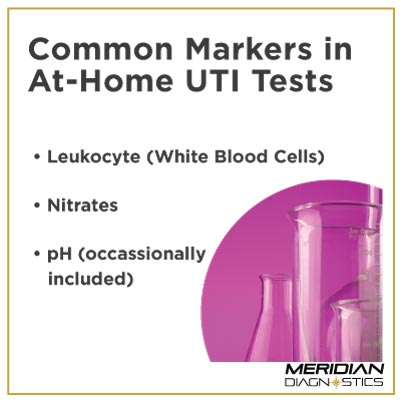Are At Home UTI Tests Accurate? And More Questions About Testing
It’s normal to feel embarrassed about the prospect of confronting potential urinary issues (like urinary tract infections, or “UTIs”) with someone else. After all, the anatomy affected is private and there’s a stigma that goes along with these types of issues — that they makes those suffering somehow “unclean”.
Unfortunately, this can cause people to avoid seeking professional help. There are at-home tests for urinary tract infections that those who suspect a UTI may consider using due to their convenience or because they’re embarrassed about talking about their symptoms with their doctor.
But, are at-home UTI tests reliable? Here’s your complete guide to UTI testing, including what you need to know before you decide to test at home over going to and getting tested by your general practitioner.
What Is A UTI Test?
 A urinary tract infection (UTI) is a common type of bacterial infection that affects any of the organs in the urinary system — including the kidneys, bladder, and urethra. UTIs can happen to anyone, but they happen more frequently in women and older adults.
A urinary tract infection (UTI) is a common type of bacterial infection that affects any of the organs in the urinary system — including the kidneys, bladder, and urethra. UTIs can happen to anyone, but they happen more frequently in women and older adults.
UTIs are fairly common, but not spoken of publicly often. They also can be recurring for certain people, and they may find themselves dealing with the symptoms often. These symptoms include a strong, constant urge to urinate and pain with urination. Most UTIs are relatively minor and if they linger, they can be treated with a round of antibiotics. If left untreated, however, a minor UTI can spread through the bladder and kidneys, becoming more severe and potentially causing damage.
Different Types Of UTI Tests
Before you can be treated for a urinary tract infection, you need to know you have one in the first place. This involves testing.
There are a few options to test for a UTI. The first is to go to your doctor’s office and submit a urine sample. The sample is put through an lab analysis that looks for the tell-tale signs of an infection — white blood cells, red blood cells, bacteria, or all of the above.
Another option is to purchase a UTI test from the store to use at home. These are commonly called “dip stick” tests due to the way they work. In these tests, you urinate into a cup and dip the testing strip into the sample as instructed.
How Does A UTI Test Work?
When performed in a clinical setting, a UTI test is highly accurate. By testing for a combination of blood cells and bacteria, a lab test is able to isolate sure signs of a UTI. When authorized by your general practitioner, the results of this test is used in the decision to write a prescription for antibiotics or another method of treatment.
The at-home tests are a little different. Though their method of detection can vary, they typically test for levels of compounds that exceed expected levels. They commonly look for two things:
Nitrite is a chemical compound produced by many of the bacteria that causes urinary tract infections. The presence of nitrite in your urine is a good sign that you have an infection and should seek professional treatment.
Leukocyte: White blood cells, or “leukocytes”, fight infections caused by viruses and bacteria. They are not typically present in urine otherwise. If there are white blood cells in your urine, there is a reason — that reason may be a UTI.
Are At-Home UTI Tests A Suitable Option?
 At first glance, an at-home UTI test seems perfectly fine. After all, they test for things that signal the presence of a UTI, right? But, this is only part of the story.
At first glance, an at-home UTI test seems perfectly fine. After all, they test for things that signal the presence of a UTI, right? But, this is only part of the story.
First, at-home testing is not 100% accurate — not even close. UTIs can be caused by a variety of different bacteria. In one study, E. Coli was present in the majority of cases, but researchers also isolated Staph bacteria, Candida, and a range of other bugs. They aren’t all accompanied by nitrite, so false negatives can occur.
Plus, since at-home tests are not being handled by trained professionals, the potential for testing error is higher, which may lead to contaminated (and unreliable) results. Further complicating the accuracy is the potential for manufacturing errors. With at-home tests, the reactive ingredients in the dip card or dip-stick, can either fail, or be misread by the user.
Second, since the order for testing didn’t come from your primary care doctor, if you do have a UTI, you’ll likely still have to visit a physician for treatment. This may even mean a lab test on top of the test you took at home, and since UTIs are typically treated with antibiotics, you’ll need a prescription written by a professional.
At-Home Vs. The Lab
We know that at-home testing is relatively simple. The “dip stick” test involves the use of a test strip that primarily detects nitrite and/or leukocytes. But we also know that it can be flawed.
On the other hand, when directed by your doctor, testing is done in a sterile way and handled by professional lab technicians.
So are lab tests significantly more accurate than tests done at home? The degree to which this is true is unclear, but one thing is certain: UTI tests performed by trained professionals in a lab are more thorough with a lower risk of resulting false negatives. This is important to consider when untreated UTIs can spread to more important organs, like the kidneys, leading to permanent damage. Furthermore, if you find yourself in a situation where you suspect a UTI, receiving a result that you are ‘negative’ and at home, does not offer you a solution for treatment, you will still likely need to see a medical professional to address the symptoms you have.
Following Your Doctors Orders Is The Best Option
Whether you end up testing at home or not, it’s always smart to consult your primary care doctor before you take action. They’ll know what’s best in your case and make sure that if you do need a test, you can get one that will be handled professionally by experts who can give you the answers you need.
Meridian provides a vast range of testing options including urine test panels that include testing for UTI signatures. Our rapid turnaround and easy to read reports are just one of the reasons practitioners choose Meridian and continue working with us. Our panel can identify 21 organisms often found in the urinary tract as well as identifying genes associated with antibiotic resistance to provide better patient treatment. Contact us for more information.
